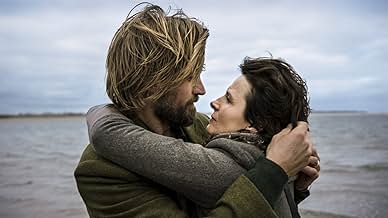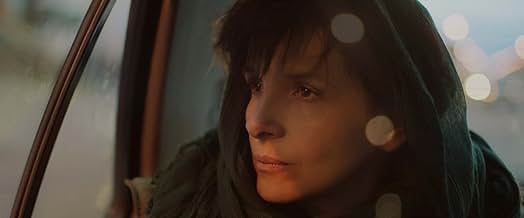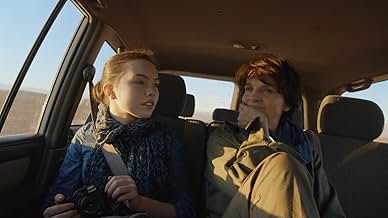IMDb-BEWERTUNG
7,0/10
8339
IHRE BEWERTUNG
Rebecca ist eine der besten Kriegsfotografinnen der Welt. Sie muss einen großen emotionalen Sturm überstehen, als ihr Mann sich weigert, ihr gefährliches Leben länger zu ertragen.Rebecca ist eine der besten Kriegsfotografinnen der Welt. Sie muss einen großen emotionalen Sturm überstehen, als ihr Mann sich weigert, ihr gefährliches Leben länger zu ertragen.Rebecca ist eine der besten Kriegsfotografinnen der Welt. Sie muss einen großen emotionalen Sturm überstehen, als ihr Mann sich weigert, ihr gefährliches Leben länger zu ertragen.
- Auszeichnungen
- 6 Gewinne & 14 Nominierungen insgesamt
Zoubida Akif
- Ariana
- (as Zoubida Afik)
Empfohlene Bewertungen
Griping drama about a war photographer who is caught between choosing her family or her work. Which we learn is a lot more complicated than we initially thought. The cast did a believable portrayal of the difficulties that people encounter in life between their passion and family. What I liked especially about this film was that the lead was not portrayed as some war hero and her story was not romanticized. The story and characters all felt realistic and convincing since the characters were different shades of gray. Something that is amiss these days within film making. There is always a need to create a struggle between good and evil. Probably one of the better stories I have seen this year. Erik Poppe you did a great job with this one!
In a warm sunny day in Montreal I went to watch the very new arrival film "A Thousand Times Good Night". I had no idea how it would be impressive because I could not find much information through the web.
All the people may encounter a paradoxical situation between their family and their job. This fact is more realizable when you are a war photographer. The first scenes of A Thousand Times Good Night are too devastating. You can feel the horror, anger, and self-sacrifice behavior in those Afghan extremists. It seems that the suicide bomber just jumped to her destiny as she had been told to do and in parallel she was scared to death. These paradoxical situations just began from the very first scene and moves through the film. The photographer, Rebecca, had her own dilemmas between her enthusiast and her family life. I think the symbolic scene which shows Rebecca plunging in reverse was frequently displayed to show how it would be difficult to decide in dilemmas. You may watch it or refuse to watch it but it worth to watch because this is life as it is!
All the people may encounter a paradoxical situation between their family and their job. This fact is more realizable when you are a war photographer. The first scenes of A Thousand Times Good Night are too devastating. You can feel the horror, anger, and self-sacrifice behavior in those Afghan extremists. It seems that the suicide bomber just jumped to her destiny as she had been told to do and in parallel she was scared to death. These paradoxical situations just began from the very first scene and moves through the film. The photographer, Rebecca, had her own dilemmas between her enthusiast and her family life. I think the symbolic scene which shows Rebecca plunging in reverse was frequently displayed to show how it would be difficult to decide in dilemmas. You may watch it or refuse to watch it but it worth to watch because this is life as it is!
War photographer Rebecca (Juliette Binoche) is one of the best at her job, obtaining the kind of pictures that invariably get published in western magazines as examples of the violence of conflicts in nonwestern areas such as Afghanistan or Kenya. The only snag is that Rebecca is so obsessed with her work that she cannot understand the damage she is doing to her family back in Ireland, especially her daughter Steph (Lauryn Canny).
The conflict between personal and professional values forms the kernel of Erik Poppe's film. Yet thematically speaking the director is far more interested in prompting reflection on the photographer's trade. While Rebecca certainly shows a good deal of bravery in trying to get the best pictures, we also understand that she is something of a voyeur who actively enjoys intruding into her subjects' personal space. Her fondness for the close-up of suffering people is quite disconcerting, especially in a sequence taking place in the back of an SUV in Afghanistan. In political terms, she adopts a neocolonialist position of the westerner taking scopophilic pleasure in the power she exerts through her camera.
Perhaps the film's most telling moment occurs back in Ireland, when Steph turns the camera on Rebecca and photographs her repeatedly. Rebecca cannot endure the experience of the lens pointing at her in such an intense manner and turns her head away, her eyes filling with tears. Would that Rebecca might understand that her subjects could feel much the same; but if she did so, then she would not be good at her job.
Given the integrity with which Poppe examines this issue, it's rather sad that the film as a whole should be somewhat melodramatic. In the end the action descends into something of a tug-of-love battle between mother and family; at one point Rebecca bundles Steph and her younger sister Lisa (Adrianna Cramer Curtis) in a pathetic attempt to abduct them from their family home. Needless to say husband Marcus (Nikolaj Coaster-Waldau) foils the plot and eventually looks after the girls himself.
The film makes a half-hearted attempt to draw a parallel between Rebecca's wanderlust and the rhythms of the tide (her daughter observes that the photographer is like the sea, coming and going), but unfortunately outstays its welcome: the last half-hour unfolds slowly but predictably towards an inevitable denouement. This is a shame, given the seriousness of its basic premise - almost as if director Poppe had lost the courage of his convictions.
The conflict between personal and professional values forms the kernel of Erik Poppe's film. Yet thematically speaking the director is far more interested in prompting reflection on the photographer's trade. While Rebecca certainly shows a good deal of bravery in trying to get the best pictures, we also understand that she is something of a voyeur who actively enjoys intruding into her subjects' personal space. Her fondness for the close-up of suffering people is quite disconcerting, especially in a sequence taking place in the back of an SUV in Afghanistan. In political terms, she adopts a neocolonialist position of the westerner taking scopophilic pleasure in the power she exerts through her camera.
Perhaps the film's most telling moment occurs back in Ireland, when Steph turns the camera on Rebecca and photographs her repeatedly. Rebecca cannot endure the experience of the lens pointing at her in such an intense manner and turns her head away, her eyes filling with tears. Would that Rebecca might understand that her subjects could feel much the same; but if she did so, then she would not be good at her job.
Given the integrity with which Poppe examines this issue, it's rather sad that the film as a whole should be somewhat melodramatic. In the end the action descends into something of a tug-of-love battle between mother and family; at one point Rebecca bundles Steph and her younger sister Lisa (Adrianna Cramer Curtis) in a pathetic attempt to abduct them from their family home. Needless to say husband Marcus (Nikolaj Coaster-Waldau) foils the plot and eventually looks after the girls himself.
The film makes a half-hearted attempt to draw a parallel between Rebecca's wanderlust and the rhythms of the tide (her daughter observes that the photographer is like the sea, coming and going), but unfortunately outstays its welcome: the last half-hour unfolds slowly but predictably towards an inevitable denouement. This is a shame, given the seriousness of its basic premise - almost as if director Poppe had lost the courage of his convictions.
A film about a female investigative journalist is bound to raise a reaction among viewers, especially when the atrocities filmed are so brutal. But that is the point being made by writer/director Erik Poppe (with added written material by Harald Rosenløw-Eeg and Kirsten Sheridan). The main character in this story is Rebecca (a radiant and brilliant Juliette Binoche), one of the world's top war photographers. She must weather a major emotional storm when her husband Marcus (Nikolaj Coaster-Waldau) refuses to put up with her dangerous life any longer. He and their young daughters – especially Steph (Lauryn Canny) but also the much younger Lisa (Adrianna Cramer Curtis) - need Rebecca, who, however, loves both her family and her work. Rebecca has been angry, since a child, over the way people around the globe focus on the detritus of local news and pay little attention to the horrors that occur daily in the countries besieged by terror. Rebecca resolves to take Steph (at Steph's request) to Kenya where inadvertently they witness terrorist acts even though Rebecca had been promised the area was safe. The result of Rebecca's endangering her daughter results in her marriage dissolving, but other changes in Rebecca's smoldering anger and angst result also.
The film is very well photographed and both Binoche and Coaster-Waldau are excellent. The supporting cast is strong (especially a very small bit part for Maria Doyle Kennedy) and the musical score by Armand Amar is deeply moving. The film places before us the incalculable struggles war correspondents face but at the same time it brings to out attention just how impossibly difficult life in troubled countries can be. Grady Harp December 14
The film is very well photographed and both Binoche and Coaster-Waldau are excellent. The supporting cast is strong (especially a very small bit part for Maria Doyle Kennedy) and the musical score by Armand Amar is deeply moving. The film places before us the incalculable struggles war correspondents face but at the same time it brings to out attention just how impossibly difficult life in troubled countries can be. Grady Harp December 14
What I was hoping would be a thought-provoking trip into the psychology of the heart of bloody conflict instead becomes a pompous, boring, weighted thing of mediocrity. It's almost as if the director believes that the seriousness of the subject matter is enough to make the film compelling to audiences - which it isn't.
Unfortunately an important theme still requires pacing - which is not best accomplished by long silences and slow-mo ad-nauseum. The cardboard supporting cast display all the range of a TV commercial trying to inspire sympathy, and there's some atrocious child acting.
I know many people will feel compelled to like this because of the subject matter and the strong female lead, but beyond the façade of great cinematography and overly emotional music this is simply not well made.
Self-importance sinks this film.
Unfortunately an important theme still requires pacing - which is not best accomplished by long silences and slow-mo ad-nauseum. The cardboard supporting cast display all the range of a TV commercial trying to inspire sympathy, and there's some atrocious child acting.
I know many people will feel compelled to like this because of the subject matter and the strong female lead, but beyond the façade of great cinematography and overly emotional music this is simply not well made.
Self-importance sinks this film.
Wusstest du schon
- Wissenswertes"A thousand time goodnight" is a line from William Shakespeare's Romeo and Juliet.
- PatzerWhen Rebecca and Marcus are walking hand in hand on the beach after drinking wine with his colleagues, the second shot is a frontal medium shot. In the upper left part of the shot, the sound operator's boom microphone is briefly, but clearly visible.
Top-Auswahl
Melde dich zum Bewerten an und greife auf die Watchlist für personalisierte Empfehlungen zu.
- How long is 1,000 Times Good Night?Powered by Alexa
Details
- Erscheinungsdatum
- Herkunftsländer
- Offizielle Standorte
- Sprachen
- Auch bekannt als
- 1,000 Times Good Night
- Drehorte
- Produktionsfirmen
- Weitere beteiligte Unternehmen bei IMDbPro anzeigen
Box Office
- Budget
- 5.284.200 € (geschätzt)
- Bruttoertrag in den USA und Kanada
- 53.895 $
- Eröffnungswochenende in den USA und in Kanada
- 24.120 $
- 26. Okt. 2014
- Weltweiter Bruttoertrag
- 2.549.568 $
- Laufzeit1 Stunde 57 Minuten
- Farbe
- Sound-Mix
- Seitenverhältnis
- 2.35 : 1
Zu dieser Seite beitragen
Bearbeitung vorschlagen oder fehlenden Inhalt hinzufügen

Oberste Lücke
By what name was Tausendmal gute Nacht (2013) officially released in India in English?
Antwort




























